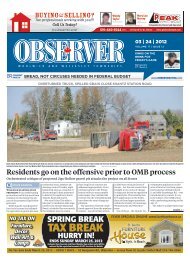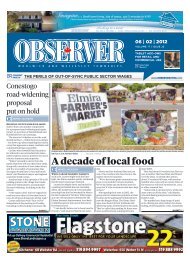08 November 1, 2008 - ObserverXtra
08 November 1, 2008 - ObserverXtra
08 November 1, 2008 - ObserverXtra
Create successful ePaper yourself
Turn your PDF publications into a flip-book with our unique Google optimized e-Paper software.
The Observer | Saturday, <strong>November</strong> 01, 20<strong>08</strong> BUSINESS | 19<br />
»FOOD FOR THOUGHT | OWEN ROBERTS<br />
Obama takes page from Willie Nelson farm plan<br />
Americans vote in<br />
a general election<br />
Tuesday, and barring<br />
a last-minute scandal<br />
or some other<br />
such calamity, they’ll<br />
make Illinois Senator<br />
Barack Obama their<br />
next president.<br />
And that means<br />
American agriculture is in for one of the<br />
biggest showdowns it’s ever seen.<br />
Obama is convinced U.S. farming has<br />
become too corporate, governed by big<br />
business. He’s unwittingly borrowed<br />
“outlaw country” musician and familyfarm<br />
activist Willie Nelson’s guide to<br />
rural America survival, by supporting<br />
small farms.<br />
Nelson, famous for starting the annual<br />
Farm Aid benefi t concerts that highlight<br />
family farmers’ struggles, has lately taken<br />
to promoting green energy, another of<br />
Obama’s platforms (Nelson even has his<br />
own brand of premium biodiesel, called<br />
BioWillie).<br />
Likewise, Obama spits at big farm business.<br />
He’s going to make sure that if<br />
American agriculture grows, it won’t be<br />
because of excessive government payments<br />
from him, that potentially make<br />
big farms even bigger.<br />
These payments have given the U.S. a<br />
black eye internationally. Billions of dollars<br />
of public money is regularly doled<br />
out to U.S. farmers to help them stay<br />
afl oat. These subsidies make it possible<br />
for U.S. farmers to sell their harvests internationally<br />
for artifi cially low prices.<br />
And because Americans are the biggest<br />
commodity exporters on the world stage,<br />
This is your chance!<br />
Come have a say!<br />
The Region of Waterloo is developing a new Regional Official Plan (ROP) to address the social<br />
and economic changes which have occurred since the approval of the existing Plan in 1995.<br />
The new ROP will also help implement the Regional Growth Management Strategy adopted by<br />
Regional Council in 2003 and reflect the significant recent changes in Provincial legislation and<br />
policy. Creating a new ROP is a collaborative process and your input is vital.<br />
The Region of Waterloo released the first draft of the<br />
new Regional Official Plan (ROP)<br />
You may also obtain a copy of the first<br />
draft of the ROP at any of our upcoming<br />
public consultation centres (see below)<br />
where you can learn more about the first<br />
draft and provide us with your feedback.<br />
Thursday, October 30<br />
3-8 p.m.<br />
North Dumfries Township Offices<br />
Slater Hall<br />
1171 Greenfield Road, North Dumfries<br />
Tuesday, <strong>November</strong> 4<br />
3-8 p.m.<br />
Region of Waterloo –<br />
Cambridge Public Health and<br />
Social Services Building<br />
Room 170<br />
150 Main Street, Cambridge<br />
Thursday, <strong>November</strong> 6<br />
3-8 p.m.<br />
Woolwich Township Offices<br />
Council Chambers<br />
24 Church Street, Elmira<br />
Thursday, <strong>November</strong> 20<br />
3-8 p.m.<br />
St.Clements Community Centre<br />
1 Green Street, St.Clements<br />
Publication: Woolwich Observer<br />
Size: 1/4 page (5.0375” x 6.9”)<br />
for public consultation on September 26, 20<strong>08</strong> at<br />
www.region.waterloo.on.ca/newrop<br />
everyone else has to follow the price<br />
down too, in order to compete.<br />
Such payments are popularly blamed<br />
for agriculture’s chronic multi-decade<br />
depression, which just started to ease<br />
over the past year or so when biofuels<br />
sparked renewed interest in common<br />
crops such as corn and wheat.<br />
But Obama thinks there’s too much of a<br />
connection between fl agging small farms<br />
and powerful U.S. agribusiness, which<br />
typically supports Republican candidates<br />
and values. He believes corporate seed,<br />
feed and agri-chemical giants such as Archer<br />
Daniels Midland, a regular target of<br />
his vile (and headquartered in his home<br />
state), are overly compensated with federal<br />
money meant for farmers. He thinks<br />
that evil corporate empire is feeding the<br />
growth of sprawling mega-farms, which<br />
are much more likely to have corporate<br />
ownership than small farms.<br />
So here’s his risky plan. He’s going to<br />
limit single-farm subsidy payments to<br />
$250,000 per farm. Obama says those<br />
subsidies must be capped “so that we<br />
don’t have continued concentration of<br />
agriculture in the hands of a few large<br />
agribusiness interests.” Besides keeping<br />
farms small, Obama says this move will<br />
save the federal treasury $1 billion over<br />
10 years.<br />
Then, he’ll take this booty and another<br />
$300 million a year and plow it into conservation<br />
and what he calls “renewable<br />
energy advancements.” That means wind<br />
power, biodiesel and ethanol production,<br />
carried out in rural America and not by<br />
corporations.<br />
Another part of his plan calls for increased<br />
funding to help farmers comply<br />
Further, you may obtain a copy of the first draft<br />
and/or learn more about the ROP by contacting<br />
any of the following Regional staff:<br />
Kevin Curtis<br />
cukevin@region.waterloo.on.ca<br />
519-575-4794<br />
Cushla Matthews<br />
mcushla@region.waterloo.on.ca<br />
519-575-4<strong>08</strong>7<br />
John Lubczynski<br />
lujohn@region.waterloo.on.ca<br />
519-575-4532<br />
Bridget Coady<br />
cbridget@region.waterloo.on.ca<br />
519-575-4500 x.3112<br />
Or write to us at:<br />
Region of Waterloo<br />
Planning, Housing and Community Services<br />
150 Frederick Street, 8th Floor<br />
Kitchener ON N2G 4J3<br />
www.region.waterloo.on.ca/newrop<br />
with a national organic certifi cation<br />
program. It can take several years for<br />
conventionally tilled land to be rid of<br />
commercially produced fertilizers, for<br />
example, during which time farmers get<br />
no income from it. Enter Obama, chequebook<br />
open.<br />
And fi nally, he wants to police feedlots<br />
or “concentrated animal feeding operations”<br />
as he calls them, which produce<br />
40 per cent of all U.S. livestock. He’ll send<br />
in the Environmental Protection Agency<br />
to limit the nitrogen, phosphorus, hydrogen<br />
sulfi de and ammonia they produce .<br />
Canadian farmers should beware.<br />
Notice under the Navigable<br />
Waters Protection Act<br />
Notice for approval<br />
of work on Firella Creek<br />
The Grand River Conservation Authority hereby gives notice that an application has<br />
been made to the Minister of Transport, Infrastructure and Communities pursuant to<br />
the Navigable Waters Protection Act for approval of the work described herein and its<br />
site and plans. Pursuant to section 9 of the said Act, the Grand River Conservation<br />
Authority has deposited with the Minister of Transport, Infrastructure and Communities,<br />
and in the office of the District Registrar of the Land Registry District of the<br />
Regional Municipality of Waterloo at 30 Duke Street West, Kitchener, Ontario under<br />
deposit number 1583319. A description of the following work, its site and plans: a<br />
safety boom and an existing dam (Wellesley Dam) across Firella Creek, located off<br />
David Street in the Town of Wellesley.<br />
Comments regarding the effect of this work on marine navigation may be<br />
directed to:<br />
Manager<br />
Navigable Waters Protection Program<br />
Transport Canada<br />
100 Front Street South<br />
Sarnia, Ontario<br />
N7T 2M4.<br />
However, comments will be considered only if they are in writing and are received not<br />
later than 30 days after the date of this notice. Although all comments conforming to<br />
the above will be considered, no individual response will be sent.<br />
Signed at Grand River Conservation Authority, Head Office, Cambridge, Ontario this<br />
27th day of October, 20<strong>08</strong>.<br />
Grand River Conservation Authority<br />
400 Clyde Road,<br />
Cambridge, Ont.<br />
(519) 621-2761<br />
If Obama levels these stipulations on<br />
homegrown farmers, he’ll impose them<br />
on imports, too. The U.S. farm lobby will<br />
demand it in exchange for any modicum<br />
of support, and use it as a non-tariff barrier<br />
to reduce competition. Obama, who<br />
is cool on free trade to begin with, will go<br />
along, under the guise of fairness and environmentalism.<br />
This won’t happen for a while. There’ll<br />
be so much infi ghting in U.S. farm circles<br />
that they’ll forget about Canada and everyone<br />
else momentarily.<br />
But let’s not have a false sense of security.<br />
Things are going to change.<br />
Salt: Environmental protection<br />
» From page 16<br />
tal.<br />
Rural areas such as Wellesley Township<br />
typically get away with using a<br />
much smaller amount of salt, even<br />
proportionately; in such areas where<br />
gravel roads are prevalent a sand-salt<br />
mix is the preferred de-icer.<br />
Last winter, for example, the municipality<br />
spread some 4,500 tonnes of sand<br />
and 1,059 tonnes of salt (compared to<br />
fi gures for 2006 of 2,500 tonnes of sand<br />
and 710 tones of salt). In addition to<br />
the emergence of new road salt alternatives<br />
that are less harmful to the<br />
environment, though perhaps more<br />
costly, are other measures that can be<br />
applied to make the administration<br />
of salt more effi cient. These include<br />
the application of wet salt (which<br />
isn’t carried off road tops as easily),<br />
and the implementation of automatic<br />
spreader controls on salt trucks.<br />
This season Wellesley is looking at<br />
employing a new salt mix that contains<br />
a wetting agent.<br />
“That allows it to stick to the road<br />
better and doesn’t bounce off into the<br />
ditch when the salter goes buy and it<br />
actually works quicker, reacts quicker<br />
and starts melting quicker than just<br />
plain rock salt,” said public works director<br />
Will McLaughlin.<br />
In parking lots and in other areas, effective<br />
measures might also include<br />
reducing or eliminating the sources<br />
creating ice, including leaky eavestroughs,<br />
or water draining onto walkways.<br />
“We’re not reducing the safety; in fact,<br />
we may be making them more safe because<br />
we’re eliminating the hazard in<br />
the fi rst place instead of just having to<br />
treat the hazard,” said Lobe.
















